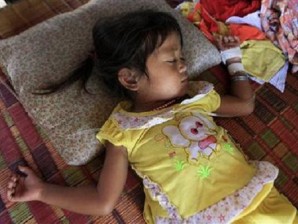EV-71 nothing new in PH

Mean Thida, 4, affected with mystery disease, sleeps at her home near a dump site at Sambour village, on the outskirts of Phnom Penh, Cambodia. A deadly form of a common childhood illness has been linked to many of the mysterious child deaths in Cambodia that caused alarm after a cause could not immediately be determined, health officials said. AP/Heng Sinith
MANILA, Philippines–It turns out that the Philippines is not exactly new to the milder forms of the virus that has killed many children in Cambodia.
The Department of Health on Tuesday said enterovirus 71 (EV-71) infections have been occurring in the country, though reported only intermittently, but the deadlier kind is “still very rare.”
Health Secretary Enrique Ona and the World Health Organization also clarified in a joint statement yesterday that the Cambodian EV-71 was of the encephalitis type and not hand-foot-and-mouth disease (HFMD), a self-limiting illness, as health experts earlier announced.
Ona explained that the virus, excreted in human feces, causes different diseases of varying intensity, which includes the usually mild HFMD, acute respiratory disease, acute flaccid paralysis and the deadly brainstem encephalitis. It is the latter that caused the death of more than 50 children in Cambodia.
The Cambodian victims experienced fever followed by rapid respiratory deterioration and impaired consciousness. Death occurred 24 hours after hospital confinement, said Ona.
Article continues after this advertisementTo ensure that the Philippines remains free of the deadly strain of the EV-71, Ona has directed all hospitals and health providers to report to the DOH individual cases, or even outbreaks, of all EV-71 infections.
Article continues after this advertisement“Mandatory notification will improve monitoring of EV-71 infections and ensure that necessary measures are in place to guarantee that the Philippines is free from the highly fatal, severe form of EV-71 infections,” stated Ona.
The health department has advised the public, especially those with infants, to properly dispose of baby diapers or human waste, to observe strict personal hygiene and observe regular hand-washing to prevent the spread of the virus.
Parents and daycare personnel have also been advised to clean and disinfect toys and teaching tools that are easily shared among children. “This can prevent EV-71 infections, as there are no known effective drugs or vaccines,” said Ona.
Assistant Health Secretary Eric Tayag said parents whose children are suffering from high fever, vomiting, lethargy and weakness should seek medical help to rule out any possible infection from EV-71.
“The public must report similar or suspected cases so that we will know if the disease is already present in the country,” Tayag said in a phone interview.
He also made it clear that there were other diseases that mimic symptoms of EV-71 infection, such as dengue, which made it all the more important to seek medical help.
There were still no travel restrictions to and from Cambodia but incoming passengers will be subjected to thermal screening upon arrival in all international airports as a routine quarantine procedure, said the DOH.